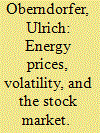| Srl | Item |
| 1 |
ID:
092859


|
|
|
|
|
| Publication |
2009.
|
| Summary/Abstract |
This paper constitutes a first analysis on stock returns of energy corporations from the Eurozone. It focuses on the relationship between energy market developments and the pricing of European energy stocks. According to our results, oil price hikes negatively impact on stock returns of European utilities. However, they lead to an appreciation of oil and gas stocks. Interestingly, forecastable oil market volatility negatively affects European oil and gas stocks, implying profit opportunities for strategic investors. In contrast, the gas market does not play a role for the pricing of Eurozone energy stocks. Coal price developments affect the stock returns of European utilities. However, this effect is small compared to oil price impacts, although oil is barely used for electricity generation in Europe. This suggests that for the European stock market, the oil price is the main indicator for energy price developments as a whole.
|
|
|
|
|
|
|
|
|
|
|
|
|
|
|
|
| 2 |
ID:
112289


|
|
|
|
|
| Publication |
2012.
|
| Summary/Abstract |
The economic modeling that policymakers typically rely on-and all the economic modeling of AB 32 (California's Global Warming Solutions Act)-assumes smooth future price paths, ignoring the reality of significant price volatility of fuels derived from crude oil. To add some insight into the value of reduced exposure to gasoline and diesel price spikes as a result of climate policies like AB 32, we define the benefit of upside hedge value: the extra avoided expenditures on gasoline and diesel fuel that accrue when their prices spike. We develop two historically-grounded price spike scenarios: a moderate spike of 25% and a large spike of 50%. After accounting for short-term price elasticity of demand effects, we estimate the upside hedge value to be between $2.4 billion and $5.2 billion (all 2007 dollars) for the moderate and large hypothetical shock scenarios, respectively.
|
|
|
|
|
|
|
|
|
|
|
|
|
|
|
|